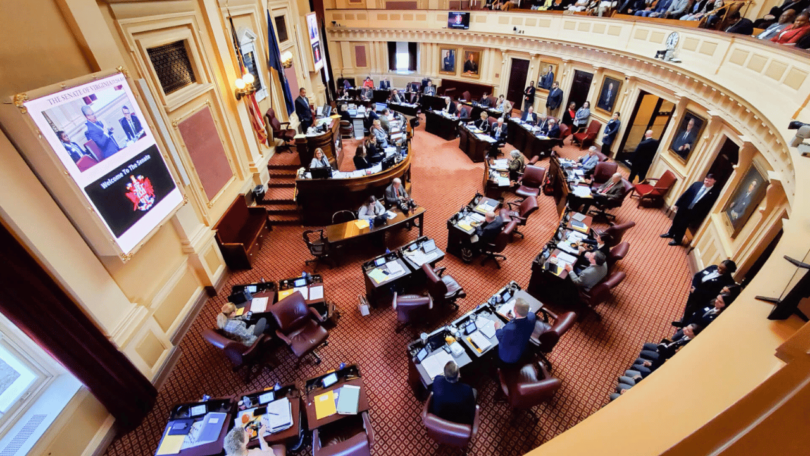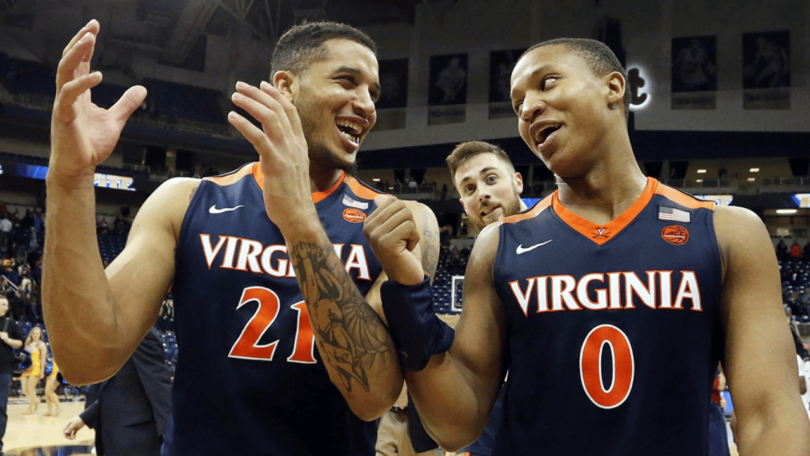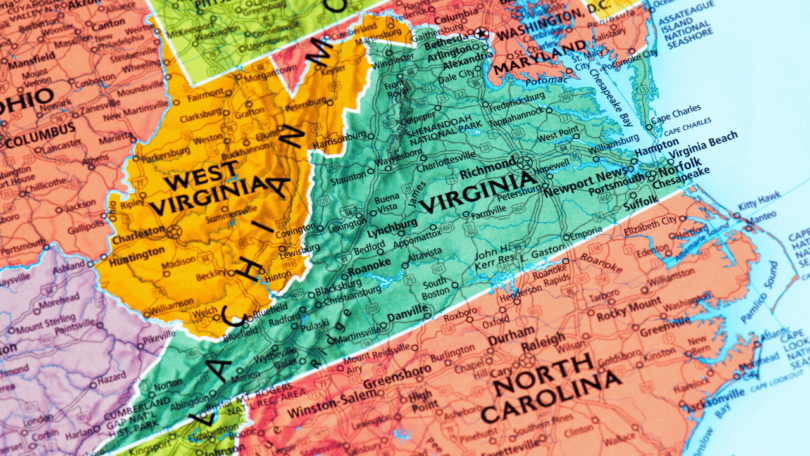Is Sports Betting Legal in Virginia? Everything You Need to Know
Yes, sports betting is completely legal in Virginia. The state kicked things off on January 21, 2021, with the launch of its online sports betting market. FanDuel was the first to take a legal bet, paving the way for a competitive and growing industry.

Legalization and History of Sports Betting in Virginia
Virginia’s journey to legal sports betting marked a major change for a state that had long-limited gambling options. The shift began in April 2020, when the Virginia General Assembly passed two key bills, SB 384 and HB 896, setting the stage for regulated sports betting. After Governor Ralph Northam gave his approval, the first legal wager was placed on January 21, 2021, through FanDuel, officially launching the state’s market.
Why Legalization Happened
Legalizing sports betting was about joining the nationwide trend and unlocking economic potential. By regulating sports wagering, Virginia aimed to generate significant revenue for education and public services while steering players away from unregulated, risky markets.
The timing couldn’t have been better, with the 2018 Supreme Court decision striking down PASPA and opening the door for states to create their own betting laws.
Key Milestones in Virginia’s Betting Journey
Virginia’s sports betting journey has been shaped by several key milestones that show just how quickly the market has grown.
It all started in November 2019, when lawmakers launched a study to explore the economic potential of legalized sports betting.
By September 2020, the Virginia Lottery Board had finalized the necessary regulations, clearing the path for operators to set up shop.

The first online sportsbook went live in January 2021, with FanDuel leading the charge and making Virginia an online-only market at launch.
Things ramped up even more in July 2022, when the state opened its first retail sportsbook, giving bettors the option to place wagers in person.
In 2023, Virginia’s market hit an impressive milestone with more than $5 billion in total wagers for the year, and in January 2024, it broke records again with $652.8 million in bets placed in a single month.
Regulatory Framework
Virginia’s sports betting market is governed by the Virginia Lottery Board, tasked with ensuring fairness, compliance, and consumer protection. This board is responsible for issuing licenses, enforcing rules, and conducting audits to maintain the integrity of operations. It also oversees responsible gambling initiatives, ensuring that operators implement programs like self-exclusion and player spending limits.
Additionally, the board monitors advertisements to prevent misleading claims and ensures they are not targeted at individuals under 21. Any violation of these regulations can lead to license suspension or revocation.
Licensing Process and Requirements
Obtaining a sports betting license in Virginia requires operators to meet strict guidelines. Applicants must submit a $250,000 fee for a three-year license, with a $200,000 renewal fee. Each applicant undergoes comprehensive background checks and must demonstrate financial stability.
Operators are also required to:
- Present detailed plans for internal controls, including measures to prevent self-excluded individuals from gambling.
- Implement robust responsible gambling tools, such as session and spending limits.
- Protect customer data and ensure secure financial transactions.
Virginia caps online betting licenses at 18, but operators tied to casinos or sports venues may receive additional licenses. The licensing structure also includes provisions for vendors and technology providers to support the industry.
Recent Developments in Virginia Sports Betting
- [October 8, 2025]: Sports Betting Money Pours into Virginia Politics Ahead of 2025 Election
- [August 22, 2025]: Virginia Lawmakers Reconsider Legalization of Online Casinos
- [June 30, 2025]: Virginia Lottery Launches First U.S. iLottery Virtual Sports Games
- [June 6, 2025]: Virginia’s Sports Betting Handle Dips to $609.7M in April but Revenue Jumps 24.5%
- [February 4, 2025]: Virginia’s Sports Betting Market Grows in December but Revenue Takes a Hit
Where to Bet on Sports in Virginia
Virginia offers sports betting enthusiasts a variety of options, with online platforms leading the way as the most accessible and popular choice. Although retail sportsbooks have started to emerge, online betting remains the dominant form of wagering in the state.
Online Sports Betting in Virginia
Virginia boasts a thriving online sports betting market, featuring 12 licensed operators. These include:
- Bally Bet
- bet365
- BetMGM
- Betr
- BetRivers
- Caesars Sportsbook
- DraftKings
- ESPN BET
- Fanatics Sportsbook
- FanDuel
- Hard Rock Bet
- Sporttrade
These platforms allow residents to place bets from anywhere within the state using a computer or mobile device. Registration is fully online, and geolocation technology ensures compliance with state regulations by verifying users’ locations.
Most operators offer user-friendly mobile apps, compatible with both iOS and Android devices, providing seamless access to live betting, diverse markets, and convenient payment options.
Retail Sportsbooks: A Growing Presence
Although online betting dominates, retail sportsbooks are beginning to make their mark in Virginia. The first in-person sportsbook opened at the Hard Rock Hotel & Casino in Bristol, with additional locations planned in Danville, Norfolk, and Portsmouth. State law permits up to five retail sportsbook licenses, allowing these venues to cater to bettors seeking a more traditional experience.

Retail sportsbooks provide an exciting atmosphere for sports fans, combining live viewing with the ability to wager on games. However, the convenience and variety offered by online platforms mean that in-person betting is likely to remain a secondary option.
Additional Betting Options
Virginia also offers Daily Fantasy Sports (DFS) platforms, such as those operated by DraftKings and FanDuel, which are fully legal and regulated. Fans of horse racing can legally wager online or at licensed facilities. Notably, the state also permits betting on eSports, providing an alternative for those interested in competitive gaming events.
Betting Options and Restrictions in Virginia
Virginia’s sports betting market offers a wide range of options while maintaining clear restrictions to ensure integrity and compliance with state laws. Whether you’re a fan of professional leagues, international competitions, or niche sports, the state provides plenty of opportunities to engage, though certain limitations apply.
Betting Options: A Diverse Range
Virginia’s legal framework allows wagers on a broad selection of events and sports. Players can explore options such as:
- Professional Sports: Fans can bet on major leagues like the NFL, NBA, MLB, and NHL, as well as other top-tier competitions.
- College Sports: Betting is permitted on collegiate events, except those involving Virginia-based teams like the University of Virginia or Virginia Tech.
- International Competitions: Bettors can engage with global events, including the Olympics, Premier League soccer, and more.
- eSports: As one of the early adopters, Virginia legalized eSports betting in 2020, giving fans of competitive gaming a chance to wager on tournaments.
- Motorsports: Races like NASCAR and Formula 1 are among the approved options.
Beyond traditional sports, players can also enjoy virtual sports and simulated games, further broadening the appeal of Virginia’s market.
Types of Bets Available
Virginia’s sportsbooks offer a variety of bet types to suit different preferences, from beginner-friendly wagers to more complex strategies:
- Moneyline Bets: Simple bets on which team or player will win.
- Point Spreads: Wagering on the margin of victory.
- Over/Under (Totals): Predicting whether the total score will be higher or lower than a set number.
- Parlays and Teasers: Combining multiple bets for higher potential payouts, with teasers allowing for adjusted point spreads.
- Prop Bets: Focused on specific in-game events, such as individual player performances or the number of goals scored.
- Futures Bets: Predicting long-term outcomes, like the winner of a championship or season awards.
- Live (In-Play) Betting: Real-time wagers placed during a game, with odds updated dynamically.
- Micro-Betting: Short-term wagers on immediate outcomes, like the next play or possession.
Restrictions: Protecting Integrity
Virginia enforces several restrictions to maintain the integrity of its betting market:
- No Betting on Virginia College Teams: Wagers on games involving teams from Virginia, such as Virginia Tech or the University of Virginia, are prohibited.

- No Prop Bets on College Sports: Bettors cannot place wagers on specific occurrences in college games, even if the teams are from out of state.
- Youth Sports: Betting on events involving minors is strictly banned.
- Political Events and Entertainment: Wagers on elections, award shows like the Oscars, or entertainment programs are not allowed.
- NFL Draft and Live Collegiate Betting: Betting on the NFL Draft is prohibited, as are in-play wagers on college games.
Virginia’s law ensures that bettors can focus on regulated and fair markets while avoiding activities that may compromise ethical standards.
Taxation and Revenue Allocation in Virginia
Virginia’s taxation model for sports betting ensures the state benefits significantly from this thriving industry while addressing critical public needs. The structured system balances generating revenue and supporting essential programs, making it a sustainable approach to managing sports wagering.
Tax Rate and Financial Responsibilities
Sports betting operators in Virginia are taxed at a 15% rate on their adjusted gross revenue (AGR). AGR is calculated as the total revenue from bets, minus payouts to winners, the value of bonuses and promotions, uncollectible debts (up to 2%), and the federal excise tax. This tax rate is considered moderate compared to other states, such as Nevada’s 6.75% and New York’s high 51%.
In addition to ongoing taxation, operators must pay a $250,000 licensing fee to begin operations, followed by a $200,000 renewal fee every three years. Any principal stakeholder with a 5% or larger ownership stake must undergo a background check, costing $50,000 per individual. Initially, operators were allowed to deduct customer acquisition costs in their first year, slightly reducing their effective tax burden.
Revenue Allocation and Public Impact
The majority of tax revenue—97.5%—is funneled into Virginia’s General Fund, which supports various public services and state operations. The remaining 2.5% is allocated to a dedicated fund for programs addressing gambling addiction, ensuring resources are available for prevention, treatment, and recovery initiatives.
While not all funds are directly earmarked for education, the General Fund indirectly supports public schools and other essential services. Additionally, revenue from the Virginia Lottery, boosted by the introduction of sports betting, continues to play a key role in funding the state’s education system.
Taxes on Player Winnings
Bettors in Virginia are also subject to taxes on their winnings. At the federal level, a 24% tax applies to winnings exceeding $600. State taxes on winnings range between 2% and 5.75%, depending on the amount won.
Market Performance and Growth in Virginia
Virginia’s sports betting industry consistently delivers impressive numbers. Monthly handles often exceed $400 million, with peaks surpassing $600 million. In January 2024, the state reached a new milestone, reporting a record handle of $652.8 million. This achievement was soon eclipsed in November 2024, when the market recorded $760.9 million, the first time a monthly handle exceeded $700 million.
Virginia’s market has consistently outpaced its own records, with year-over-year growth rates demonstrating its robust trajectory. For instance, April 2024 saw a 32.3% increase in handle compared to April 2023, while May 2024 posted a 25.2% rise from the same month in the previous year. Cumulatively, the market’s total handle surpassed an impressive $17 billion since its inception.
In 2023 alone, Virginia’s sports betting handle reached $5.53 billion, up from $4.9 billion in 2022. The state’s ability to hit $1 billion in total handle faster than any other U.S. market further underscores its rapid ascent.
Economic Impact and Revenue
The financial benefits of sports betting in Virginia are undeniable. Tax revenue from the industry provides a reliable funding source for the state, contributing to critical programs. In January 2024, tax contributions from sports betting exceeded $10 million. Over the course of 2023, operators generated $560.2 million in revenue, resulting in $72.3 millionin state tax revenue.
The market’s 10% average hold rate—the percentage of wagers retained by operators after payouts—remains competitive and stable, further contributing to the state’s economic success. These revenues directly support Virginia’s General Fund and programs addressing gambling addiction, demonstrating a balanced approach to leveraging sports betting as a public benefit.
Factors Driving Growth
Virginia’s success is driven by multiple factors, including widespread access to online platforms and mobile apps. These user-friendly technologies allow residents to place bets conveniently from anywhere within the state. Operators compete aggressively with enticing bonuses and promotions, attracting both new and experienced bettors.
The market’s focus on popular professional sports leagues like the NFL, NBA, MLB, and NHL has also contributed to its appeal. Meanwhile, the inclusion of eSports and international events diversifies wagering opportunities, catering to a broader audience.
Even the legalization of sports betting in neighboring states, such as Maryland and Tennessee, has bolstered Virginia’s market by creating a competitive yet synergistic regional betting ecosystem.
Virginia vs. Neighboring States
In Maryland, sports betting began with retail sportsbooks in 2021, followed by online betting in late 2023. This hybrid model provides flexibility for players, but Virginia’s fully online framework offers unmatched convenience. Similarly, West Virginia has allowed both retail and online betting since 2018, featuring a broad range of options despite its smaller population.

In Tennessee, another online-only market, sports betting has thrived since its launch in 2020. Tennessee’s smaller population results in a lower total handle compared to Virginia, but both states leverage their digital models effectively. North Carolina, by contrast, started with limited retail options in 2021 and only launched online platforms in 2024, showcasing a slower adoption of digital betting.
Nearby Washington, D.C., offers restricted online betting, tied to geofenced locations near retail sportsbooks, a stark contrast to Virginia’s unrestricted statewide access. Kentucky, a more recent entrant, began online sports betting in 2023 but has yet to establish a market comparable to Virginia’s scale.
Market Advantages of Virginia
Virginia’s emphasis on a fully online market provides unparalleled accessibility. Players can wager from anywhere in the state without visiting physical locations, making it ideal for modern bettors. The state boasts 12 licensed online operators, including major brands like BetMGM, FanDuel, Caesars Sportsbook, and DraftKings, fostering a competitive environment that benefits players through robust promotions and bonuses.
Unlike states that mandate partnerships with local casinos, Virginia allows operators to enter the market independently. This flexibility encourages broader competition and innovation, including options like micro-betting, which caters to a new generation of players seeking fast-paced wagering experiences.
Regulatory Strength and Player Safety
Virginia’s sports betting market is tightly regulated by the Virginia Lottery, ensuring operators meet strict standards for transparency and security. These measures include safeguarding players’ personal and financial data and enforcing responsible gambling practices. The state’s allowance for betting on eSports and Daily Fantasy Sports (DFS) adds to its appeal, offering more wagering options than many other states.
Responsible Gambling Initiatives in Virginia
The Virginia Lottery leads the charge in promoting responsible gambling. It offers tools like self-exclusion programs, allowing players to voluntarily suspend their access to gambling for two years, five years, or permanently. Players can also set deposit and betting limits to manage their spending and time on betting platforms.
Education plays a key role in the state’s strategy. The Lottery provides resources highlighting the risks of gambling and directs players to support services. Part of its funding is allocated to addiction treatment programs, ensuring help is available for those in need. To maintain transparency, the Lottery publishes monthly reports on betting activity, monitoring market trends and identifying potential issues.
Operator Requirements
Virginia’s licensed operators must uphold high standards of responsible gambling. Online platforms are required to offer features like session time limits, temporary account suspensions, and spending caps. Operators also ensure 24/7 access to resources like hotlines and live chat support for problem gambling.
Additionally, operators are held accountable for the content and delivery of their advertisements. Ads cannot target minors or mislead consumers, and staff are trained to recognize and address signs of gambling addiction. Some platforms even implement loyalty programs that reward responsible betting behavior.
Available Support Resources
The Virginia Council on Problem Gambling (VCPG) is a cornerstone of the state’s support network. It offers a 24/7 helpline at 888-532-3500, along with live chat support through its website. National resources like 1-800-GAMBLER and text lines such as 800GAM extend additional layers of assistance.
Support groups, such as those provided by Gamblers Anonymous, offer players and their families peer support and guidance. Information about these resources is easily accessible through operator websites and the Virginia Lottery’s online portals.
Industry and State Collaboration
Virginia fosters collaboration between operators and organizations like the VCPG to address gambling-related issues effectively. The state enforces responsible gambling provisions as part of its licensing requirements, with the Virginia Lottery empowered to deny renewals for non-compliance.
FAQs About Sports Betting in Virginia

Is sports betting legal in Virginia?
Yes, sports betting is legal in Virginia. Online sports betting was legalized in April 2020 through the passage of bills SB 384 and HB 896. The first legal bet was placed on January 21, 2021, through FanDuel.
What types of bets can I place in Virginia?
Virginia offers a wide range of betting options, including:
- Moneyline: Betting on the winner of a game.
- Point Spread: Wagering on the margin of victory or defeat.
- Over/Under: Betting on the total points scored in a game.
- Futures: Long-term bets like championship winners.
- Prop Bets: Betting on specific events during a game.
- Live Betting: Wagering during a game with real-time odds.
Can I bet on Virginia college teams?
No, betting on Virginia college teams, such as the University of Virginia or Virginia Tech, is prohibited. This restriction also includes prop bets related to these teams. However, you can bet on college teams from other states.
Which online sportsbooks are available in Virginia?
Virginia currently hosts 12 legal online sportsbooks, including popular platforms like:
- BetMGM
- Caesars Sportsbook
- DraftKings
- FanDuel
- Bet365
- Fanatics Sportsbook
This list is subject to change as new operators enter the market or existing ones exit.
How old do I need to be to place a bet in Virginia?
The legal minimum age for sports betting in Virginia is 21 years old. Age verification is required during the registration process on licensed platforms.
How are sports betting revenues used in Virginia?
Virginia imposes a 15% tax on adjusted gross revenue from sports betting operators. The majority (97.5%) of the revenue goes to the Virginia General Fund, which supports public services, including education. A portion (2.5%) is allocated to programs addressing gambling addiction.
Can I place bets in person in Virginia?
Yes, but in-person betting options are limited. While Virginia initially offered only online betting, retail sportsbooks have opened in casinos like Hard Rock Hotel & Casino in Bristol. Additional venues in Danville, Norfolk, and Portsmouth are expected to expand in-person betting options.
Recommended
